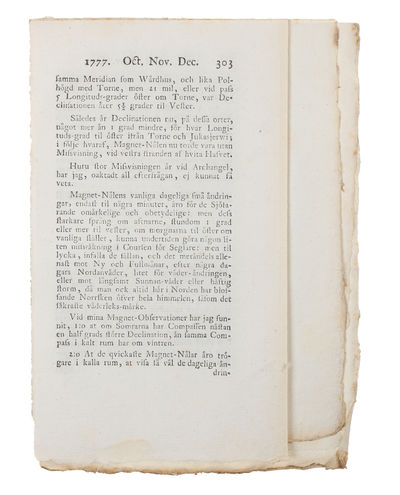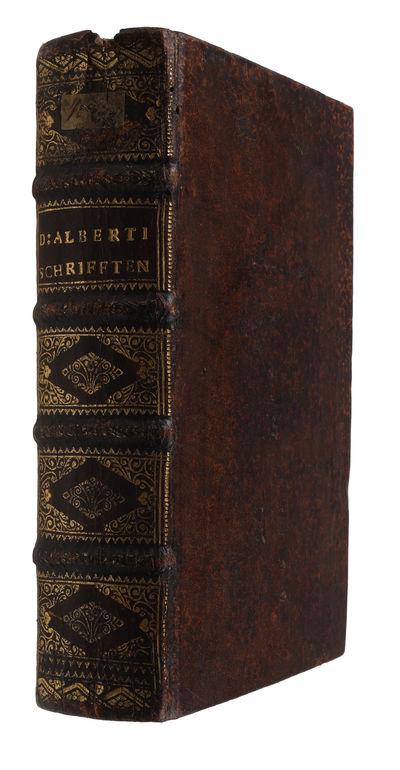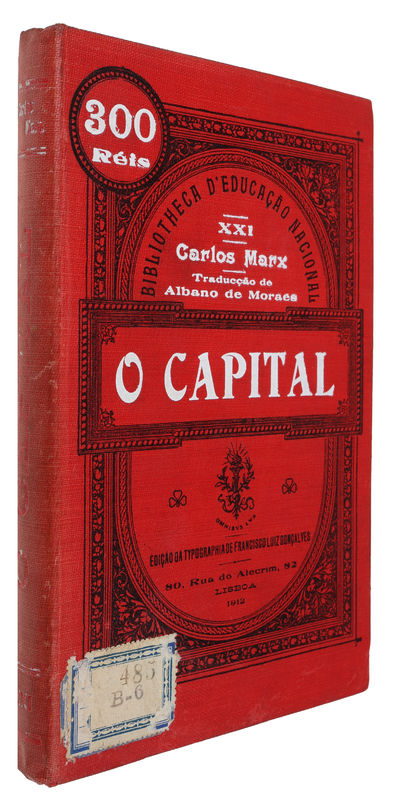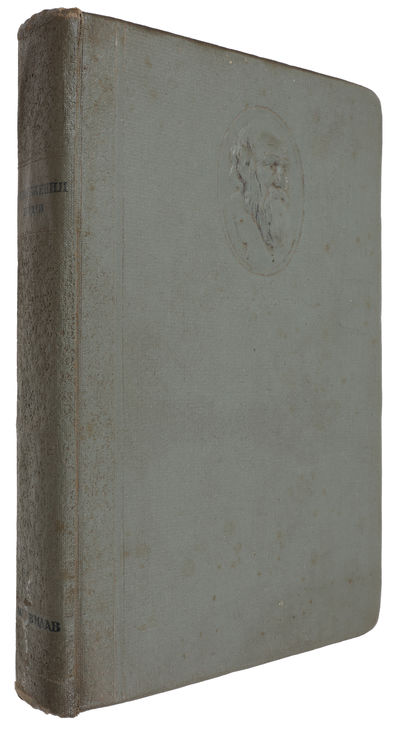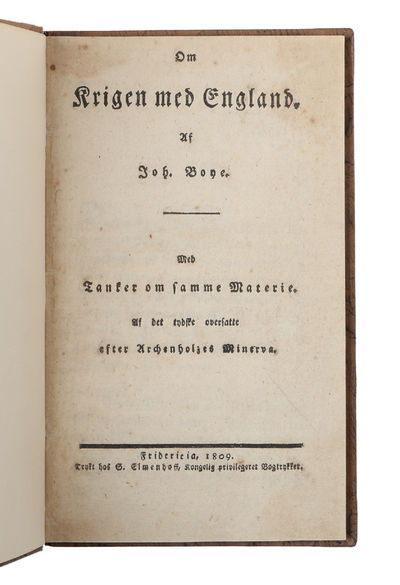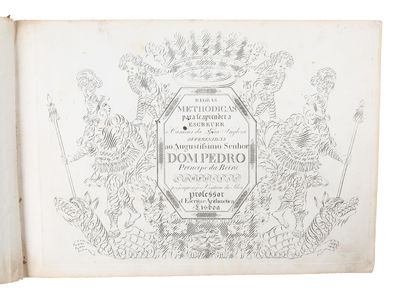TARSKI, ALFRED.
Pojecie Prawdy w Jezykach Nauk Dedukcyjnych (Polish). [The Concept of Truth in Formalized Languages]. - [FOUNDING MODERN LOGICAL SEMANTICS]
Herman H. J. Lynge & Søn A/S
lyn35832
Warszawa, 1933. Small 4to. Orig. printed wrappers, sunned at the edges, but otherwise near mint condition, also internally. An excellent copy. VII, (1), 116, (1, - errata) pp.
The exceedingly scarce first printing of Tarski's most important and influential work, "The Concept of Truth in Formalized Languages", which founded modern logical semantics.The work appeared in an extremely small number, in Polish, and many copies of the article have later been destroyed, thus, the work is of the utmost scarcity. In this seminal article the Polish-American logician and mathematician Alfred Tarski devotes himself to "the definition of truth". "Its task is to construct -with reference to a given language- a materially adequate and formally correct definition of the term "true sentence"." (Introduction, English translation, 1956). With this work the face of logic was changed forever. The "Concept of Truth" constitutes a landmark event in 20th century analytic philosophy, and it ranks as one of the most important contributions to symbolic logic, semantics and philosophy of language. In this work Tarski develops the semantic theory of truth for formal languages and determines the fact that no language can contain its own truth predicate. Tarski thus concluded that the semantic theory could not be applied to any natural language. -This was later used by e.g. Davidson to construct his truth-conditional semantics, and the problems solved by Tarski are some of the same that Russell and Whitehead struggled to solve in their "Principia Mathematica".Tarski (1901-1983) has contributed seminally to the fields of mathematics and logic in a number of ways, and together with Frege, Russell and Gödel, he now ranks as one of the most important contributors to the field of modern logic. At the time of Franz Brentano (1838-1917), one of the philosophers of the greatest significance for contemporary philosophy and in many ways a forerunner of present-day empiricism, it was very unusual for a metaphysician to acknowledge that philosophical investigation must go hand in hand with an analysis of language. Linguistic analysis has thus been almost totally limited to the pure empiricists of philosophy, who reject all forms of metaphysics. Meanwhile, ontologists and metaphysicians have been satisfied with the ordinary language and asked no questions about its possible limitations, merely dismissing the logical faults and adding the odd neologisms. Today, however, especially within the English speaking tradition, linguistic analysis has reached a degree unheard of at the time of Brentano, and it is now generally accepted that certain logical and epistemological problems can be solved only by forsaking ordinary language and substituting it for artificially constructed language systems that follow certain principles. Thus, difficulties that appeared within earlier philosophical doctrines are meant to disappear if the theory can be formulated more precisely, and one of the most important examples is the "adequacy theory of truth". Tarski shows that the concept of truth of the adequacy theory can be introduced in a perfectly exact way within the formalized language systems that are equipped with precise rules of interpretation, and thus he rids us of the usual misgivings against the concept of truth. And thus he has developed one of the most important theories of modern logic."Tarski's investigations are of singular philosophical significance for another reason as well. Within the framework of semantics, which he founded and which Carnap later developed further, it becomes possible for the first time to introduce the notion of an analytic judgment (or an analytic statement) in a form that is both sufficiently general and of the utmost precision. This notion also plays an exceptionally important role in Brentano's philosophy, especially in his studies in formal logic." (Stegmüller, Main Currents... p. 56). When constructing a semantical system, a vocabulary of the desired object language must be determined as the first. Then formulation rules must be specified, before the rules of interpretation are laid down, and finally the rules of application are supplied. The most important rules here are the rules of truth, and the concept of truth is one of the most important semantical concepts at all, for without them no understanding of the sentences within the system would be ensured. And, of course, the truth definitions must satisfy a condition of adequacy. "...This form of an adequacy condition that must be satisfied by every semantical truth concept goes back to the Polish logician, Stanislaw Lesniewski. But it was the logician Alfred Tarski who above all made use of this notion, and who first studied in detail the possibilities of introducing a formally exact and materially adequate concept of truth into the precise languages of science. Carnap's accounts of semantical systems rest largely on the prior works of Tarski." (Stegmüller, p. 311). Tarski also pointed out that it is necessary for all semantical concepts, and especially for the concept of truth, to strictly separate object language and metalanguage. Otherwise we would put ourselves in the unlucky position of being able to prove both a statement and its negation at the same time. In the English translation from 1956 of Tarski's works, "Logic, Semantics, Metamathematics", the bibliographical information about this article is erroneous.
The exceedingly scarce first printing of Tarski's most important and influential work, "The Concept of Truth in Formalized Languages", which founded modern logical semantics.The work appeared in an extremely small number, in Polish, and many copies of the article have later been destroyed, thus, the work is of the utmost scarcity. In this seminal article the Polish-American logician and mathematician Alfred Tarski devotes himself to "the definition of truth". "Its task is to construct -with reference to a given language- a materially adequate and formally correct definition of the term "true sentence"." (Introduction, English translation, 1956). With this work the face of logic was changed forever. The "Concept of Truth" constitutes a landmark event in 20th century analytic philosophy, and it ranks as one of the most important contributions to symbolic logic, semantics and philosophy of language. In this work Tarski develops the semantic theory of truth for formal languages and determines the fact that no language can contain its own truth predicate. Tarski thus concluded that the semantic theory could not be applied to any natural language. -This was later used by e.g. Davidson to construct his truth-conditional semantics, and the problems solved by Tarski are some of the same that Russell and Whitehead struggled to solve in their "Principia Mathematica".Tarski (1901-1983) has contributed seminally to the fields of mathematics and logic in a number of ways, and together with Frege, Russell and Gödel, he now ranks as one of the most important contributors to the field of modern logic. At the time of Franz Brentano (1838-1917), one of the philosophers of the greatest significance for contemporary philosophy and in many ways a forerunner of present-day empiricism, it was very unusual for a metaphysician to acknowledge that philosophical investigation must go hand in hand with an analysis of language. Linguistic analysis has thus been almost totally limited to the pure empiricists of philosophy, who reject all forms of metaphysics. Meanwhile, ontologists and metaphysicians have been satisfied with the ordinary language and asked no questions about its possible limitations, merely dismissing the logical faults and adding the odd neologisms. Today, however, especially within the English speaking tradition, linguistic analysis has reached a degree unheard of at the time of Brentano, and it is now generally accepted that certain logical and epistemological problems can be solved only by forsaking ordinary language and substituting it for artificially constructed language systems that follow certain principles. Thus, difficulties that appeared within earlier philosophical doctrines are meant to disappear if the theory can be formulated more precisely, and one of the most important examples is the "adequacy theory of truth". Tarski shows that the concept of truth of the adequacy theory can be introduced in a perfectly exact way within the formalized language systems that are equipped with precise rules of interpretation, and thus he rids us of the usual misgivings against the concept of truth. And thus he has developed one of the most important theories of modern logic."Tarski's investigations are of singular philosophical significance for another reason as well. Within the framework of semantics, which he founded and which Carnap later developed further, it becomes possible for the first time to introduce the notion of an analytic judgment (or an analytic statement) in a form that is both sufficiently general and of the utmost precision. This notion also plays an exceptionally important role in Brentano's philosophy, especially in his studies in formal logic." (Stegmüller, Main Currents... p. 56). When constructing a semantical system, a vocabulary of the desired object language must be determined as the first. Then formulation rules must be specified, before the rules of interpretation are laid down, and finally the rules of application are supplied. The most important rules here are the rules of truth, and the concept of truth is one of the most important semantical concepts at all, for without them no understanding of the sentences within the system would be ensured. And, of course, the truth definitions must satisfy a condition of adequacy. "...This form of an adequacy condition that must be satisfied by every semantical truth concept goes back to the Polish logician, Stanislaw Lesniewski. But it was the logician Alfred Tarski who above all made use of this notion, and who first studied in detail the possibilities of introducing a formally exact and materially adequate concept of truth into the precise languages of science. Carnap's accounts of semantical systems rest largely on the prior works of Tarski." (Stegmüller, p. 311). Tarski also pointed out that it is necessary for all semantical concepts, and especially for the concept of truth, to strictly separate object language and metalanguage. Otherwise we would put ourselves in the unlucky position of being able to prove both a statement and its negation at the same time. In the English translation from 1956 of Tarski's works, "Logic, Semantics, Metamathematics", the bibliographical information about this article is erroneous.
Adresse:
Silkegade 11
DK-1113 Copenhagen Denmark
Telefon:
CVR/VAT:
DK 16 89 50 16
E-post:
Nettsted:
![Pojecie Prawdy w Jezykach Nauk Dedukcyjnych (Polish). [The Concept of Truth in Formalized Languages]. - [FOUNDING MODERN LOGICAL SEMANTICS] (photo 1)](https://d3525k1ryd2155.cloudfront.net/h/347/980/1035980347.0.l.jpg)
![Pojecie Prawdy w Jezykach Nauk Dedukcyjnych (Polish). [The Concept of Truth in Formalized Languages]. - [FOUNDING MODERN LOGICAL SEMANTICS] (photo 2)](https://d3525k1ryd2155.cloudfront.net/h/347/980/1035980347.1.l.0.jpg)
